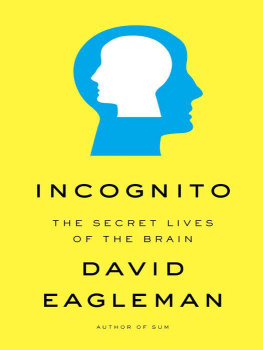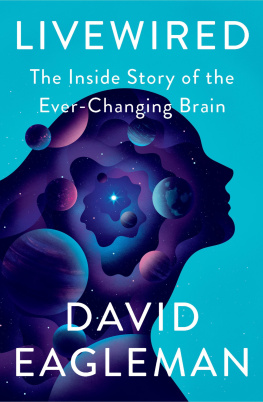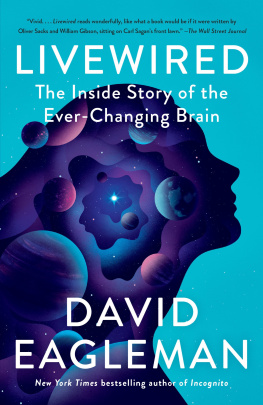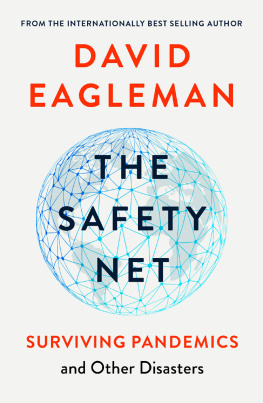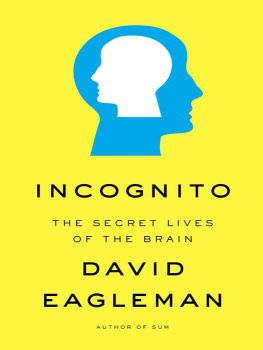David Eagleman - Incognito: The Secret Lives of the Brain
Here you can read online David Eagleman - Incognito: The Secret Lives of the Brain full text of the book (entire story) in english for free. Download pdf and epub, get meaning, cover and reviews about this ebook. publisher: Pantheon, genre: Religion. Description of the work, (preface) as well as reviews are available. Best literature library LitArk.com created for fans of good reading and offers a wide selection of genres:
Romance novel
Science fiction
Adventure
Detective
Science
History
Home and family
Prose
Art
Politics
Computer
Non-fiction
Religion
Business
Children
Humor
Choose a favorite category and find really read worthwhile books. Enjoy immersion in the world of imagination, feel the emotions of the characters or learn something new for yourself, make an fascinating discovery.
- Book:Incognito: The Secret Lives of the Brain
- Author:
- Publisher:Pantheon
- Genre:
- Rating:5 / 5
- Favourites:Add to favourites
- Your mark:
Incognito: The Secret Lives of the Brain: summary, description and annotation
We offer to read an annotation, description, summary or preface (depends on what the author of the book "Incognito: The Secret Lives of the Brain" wrote himself). If you haven't found the necessary information about the book — write in the comments, we will try to find it.
A stunning exploration of the we_ behind the I. Eagleman reveals, with his typical grace and eloquence, all the neural magic tricks behind the cognitive illusion we call reality. Jonah Lehrer, author of How We Decide_
Eagleman has a talent for testing the untestable, for taking seemingly sophomoric notions and using them to nail down the slippery stuff of consciousness. _New Yorker_
Your mind is an elaborate trick, and mastermind David Eagleman explains how the trick works with great lucidity and amazement. Your mind will thank you. Kevin Kelly, Wired Magazine
A fun read by a smart person for smart peopleit will attract a new generation to ponder their inner workings. _New Scientist
Written in clear, precise language, the book is sure to appeal to readers with an interest in psychology and the human mind, but it will also please people who just want to know, with a little more clarity, what is going on inside their own skulls. Booklist
_
Original and provocativeIncognito is a smart, captivating book that will give you a prefrontal workout. _Nature
Incognito is fun to read, full of neat factoids and clever experiments...Eagleman says hes looking to do for neuroscience what Carl Sagan did for astrophysics, and hes already on his way. Texas Monthly_ _
_Although Incognito is face-paced, mind-bending stuff, its a book for regular folks. Eagleman does a brilliant job refining heavy science into a compelling read. He is a gifted writer. -_Houston Chronicle_
A popularizer of impressive gusto[Eagleman] aims, grandly, to do for the study of the mind what Copernicus did for the study of the stars. _N... _
Product DescriptionIf the conscious mindthe part you consider to be youis just the tip of the iceberg, what is the rest doing?
In this sparkling and provocative new book, the renowned neuroscientist David Eagleman navigates the depths of the subconscious brain to illuminate surprising mysteries: Why can your foot move halfway to the brake pedal before you become consciously aware of danger ahead? Why do you hear your name being mentioned in a conversation that you didnt think you were listening to? What do Ulysses and the credit crunch have in common? Why did Thomas Edison electrocute an elephant in 1916? Why are people whose names begin with J more likely to marry other people whose names begin with J? Why is it so difficult to keep a secret? And how is it possible to get angry at yourselfwho, exactly, is mad at whom?
Taking in brain damage, plane spotting, dating, drugs, beauty, infidelity, synesthesia, criminal law, artificial intelligence, and visual illusions, Incognito is a thrilling subsurface exploration of the mind and all its contradictions.
From the Hardcover edition.
Genre : Non-fiction Formats : EPUB, MOBI Quality : 5David Eagleman: author's other books
Who wrote Incognito: The Secret Lives of the Brain? Find out the surname, the name of the author of the book and a list of all author's works by series.

